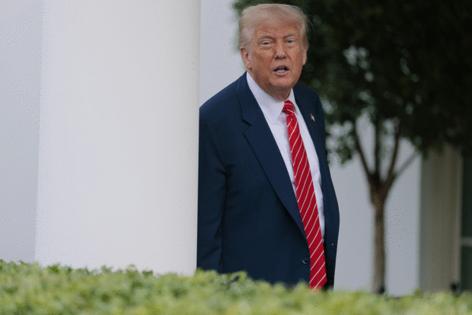Commentary: Trump's first 100 days changed the game – the next 1,300 could change the nation
Published in Op Eds
The country has now witnessed and felt the first 100 days of President Donald Trump’s second term. These days were filled with unrelenting, fast-paced executive action.
He signed a record-breaking number of executive orders, though many have been challenged and may be reversed. Working with Congress to pass legislation, though more difficult, leads to more enduring change and is less likely to be challenged in court.
While certainly eventful, the jury is still out on how effective these first days have been. More importantly, the period of greater consequence — the months following the first 100 days, which should focus on implementation — will ultimately determine whether the president’s drastic changes can stand the test of time and have their desired impact on American society.
The first months of all presidential terms include outlining a vision and using presidential influence to shift priorities and change governance structures. The media often focuses on polling and popularity, comparing previous presidents and highlighting public perception of the president's handling of specific issues like the economy, immigration, and national defense.
Rasmussen Reports' daily presidential tracking poll now shows 50 percent of likely voters approve of Trump's job performance, but change has never been popular, and he is unapologetically pursuing it in these first months.
The Trump administration should be credited for impressive planning and execution, transitioning from campaign to elected official, with a rapid roll-out of policy objectives and assembly of nearly his entire cabinet with blinding speed.
We should also recognize the level of transparency brought to government spending and operations through publicized data and open sharing of findings of digital investigations into federal agencies. The president has also spurred national dialogue about the role, size, and management of government and public servants (which has forced introspection among government agencies and government-adjacent organizations that support them).
The president’s goals and areas of focus include higher levels of military recruitment, lower numbers of migrant crossings at the southern border, loosening of regulations to increase energy production, increased foreign investment to promote the creation of manufacturing jobs, attempts to reduce or eliminate global trade imbalances, and promoting a merit-based society.
Yet any progress toward achieving these feats will be overshadowed, and Trump risks being remembered by some for retribution, destruction, authoritarianism, bigotry, and vitriol if his administration doesn’t change tactics soon.
The current approach — indiscriminately dismissing public servants, erratic economic policy stances, and strong-arm use of government pressure to reshape social issues in schools, businesses, and institutions — is being challenged by a growing number of people in the court of public opinion, not to mention actual courts with greater jurisdiction across the country.
Trump has three critical opportunities to strengthen the federal government through smarter personnel management, greater accountability, and improved operational effectiveness.
First, while the administration’s new civil service regulations reclassifying upwards of 50,000 federal employees aim to enhance policy responsiveness, they fall short of addressing the deeper flaws in the federal hiring process. Structural reforms, not just removals, are needed to modernize how talent is recruited and retained.
Second, the creation of the Department of Government Efficiency has sown confusion, fear, and unnecessary duplication. Rather than building a new bureaucracy, the administration should work with existing oversight bodies like auditors and inspectors general with clearer mandates and resources to combat fraud, waste, abuse, and mismanagement.
Third, the administration must articulate a coherent vision and management agenda, complete with clear performance goals, timelines, and feedback loops. These tools are well-known, effective, and already embedded within the government. What's needed is top-level leadership commitment and empowered public servants to use these mechanisms to their full potential.
His first 100 days and attempts at bold reform underscore that incremental changes in governance are no longer sufficient to address the magnitude of challenges facing the nation, and the country should move beyond improving government to transforming it.
The president, Congress, the public, and the public administration community have important roles to play in reshaping government. The next 100 days call for once-in-a-generation leadership typified by respect for people, adherence to the rule of law, and rebuilding institutions that can help reestablish trust and deliver the results the American people deserve.
The next 1,300 days will be important for all of us. The president has demonstrated that the government deeply impacts our daily lives—every person and every community across our country. In the months to come, how we provide care and services to our most vulnerable populations, ensure the economic stability of our markets and individual households, secure our borders, and ensure the safety of our neighborhoods, and learn about our history and our country's traditions will be affected.
Trump has an opportunity to truly be transformative and earn a place among the most consequential leaders of our time. In his first 100 days in office, he has attempted to overwhelm opposition and disrupt the administrative state. Still, now his charge should be to implement a positive vision for America that includes everyone, unites a sharply divided country, and rebuilds government as something all Americans can call great again.
____
James-Christian B. Blockwood is the President and Chief Executive Officer of the National Academy of Public Administration.
____
©2025 The Fulcrum. Visit at thefulcrum.us. Distributed by Tribune Content Agency, LLC.

























































Comments